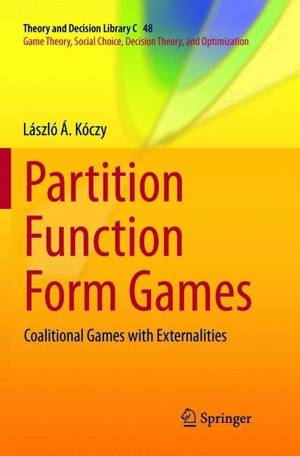
Bedankt voor het vertrouwen het afgelopen jaar! Om jou te bedanken bieden we GRATIS verzending (in België) aan op alles gedurende de hele maand januari.
- Afhalen na 1 uur in een winkel met voorraad
- In januari gratis thuislevering in België
- Ruim aanbod met 7 miljoen producten
Bedankt voor het vertrouwen het afgelopen jaar! Om jou te bedanken bieden we GRATIS verzending (in België) aan op alles gedurende de hele maand januari.
- Afhalen na 1 uur in een winkel met voorraad
- In januari gratis thuislevering in België
- Ruim aanbod met 7 miljoen producten
Zoeken
€ 274,95
+ 549 punten
Uitvoering
Omschrijving
This book presents a systematic overview on partition function form games: a game form in cooperative game theory to integrate externalities for various applications. Cooperative game theory has been immensely useful to study a wide range of issues, but the standard approaches ignore the side effects of cooperation. Recently interest shifted to problems where externalities play the main roles such as models of cooperation in market competition or the shared use of public resources. Such problems require richer models that can explicitly evaluate the side-effects of cooperation. In partition function form games the value of cooperation depends on the outsiders' actions. A recent surge of interest driven by applications has made results very fragmented. This book offers an accessible, yet comprehensive and systematic study of properties, solutions and applications of partition function games surveying both theoretical results and their applications. It assembles a survey of existing research and smaller original results as well as original interpretations and comparisons. The book is self-contained and accessible for readers with little or no knowledge of cooperative game theory.
Specificaties
Betrokkenen
- Auteur(s):
- Uitgeverij:
Inhoud
- Aantal bladzijden:
- 312
- Taal:
- Engels
- Reeks:
- Reeksnummer:
- nr. 48
Eigenschappen
- Productcode (EAN):
- 9783030099145
- Verschijningsdatum:
- 2/02/2019
- Uitvoering:
- Paperback
- Formaat:
- Trade paperback (VS)
- Afmetingen:
- 156 mm x 234 mm
- Gewicht:
- 471 g

Alleen bij Standaard Boekhandel
+ 549 punten op je klantenkaart van Standaard Boekhandel
Beoordelingen
We publiceren alleen reviews die voldoen aan de voorwaarden voor reviews. Bekijk onze voorwaarden voor reviews.









